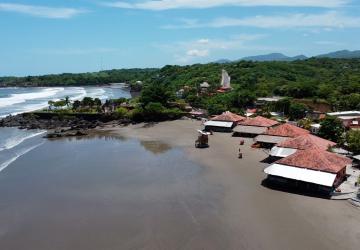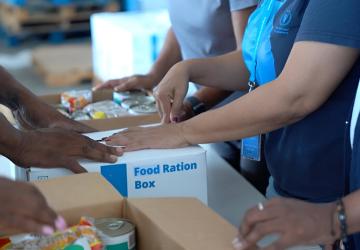Remarks by Didier Trebucq, UN Resident Coordinator for Barbados and the Eastern Caribbean
Remarks by Didier Trebucq, UN Resident Coordinator for Barbados and the Eastern Caribbean at a Member State briefing on 4 April 2023, at UNHQ in New York entitled "Enhanced support to Small Island Developing States: a case study from Saint Vincent & the Grenadines and the Multi-Country Office of Barbados & the Eastern Caribbean."
Ladies and Gentlemen
At the outset, let me express my personal appreciation to the Permanent Representatives of Saint Vincent and the Grenadines and Barbados for the strong partnership between the UN and your governments where it matters most – on the ground.
In 2021, the La Soufriere Volcano eruption in Saint Vincent was a decisive test for how the Resident Coordinator - working synergistically with the government - can leverage the best of the UN system to help countries rapidly respond to crises, recover faster and lay the building blocks for long term resilience. I am proud of the way the UN system came together to respond in “development emergency mode,” delivering vital humanitarian and recovery assistance to help people and communities to bounce back.
In countries covered by the Barbados MCO, there is no designated Humanitarian Coordinator – as is the case for most countries. When disaster strikes, it is the RC system that must step up. Using a one-UN approach, I brought the system together to provide immediate relief including removal of ashes, water and food, psycho-social support to vulnerable groups such as women and children, rehabilitate community infrastructure, restore livelihoods and lay the groundwork for faster recovery.
What difference has the reform made?
First, it is important to remember that earlier, the UN Resident Coordinator in the Barbados MCO was supported by only one person in the office. The RCO had almost no budget, meaning - almost no capacity to respond to multiple requests from 10 countries and territories.
With only a sub-regional strategy that focused on the general needs of all countries under the MCO, it is fair to say that our UN system was not fully equipped to respond efficiently to frequent exogenous shocks and not prepared to accompany SIDS like Saint Vincent and the Grenadines in their resilience building journey.
After the strengthening of the RC system and the investments in SIDS made through the MCO review; today the evidence is clear that the UN is not only better equipped but is making a material difference in SIDS.
As a result, I wish to illustrate with 4 points how we have joined up across all UN entities to better support countries under our MCO:
1. We put forward A country focused UN value proposition for each SIDS
- For the first time, in addition to a truly strategic Cooperation Framework for the Caribbean region, we now have Country Implementation Plans for each of the 10 countries and territories covered by this MCO: Climate resilience; food security; digitalization; blue economy and women economic empowerment.
- And unlike in the past, these CIPs were prepared by the UNCT with joint planning and high-level policy level dialogues, which I convened together with PMs and their Cabinet ministers of each country.
- Even agencies without a physical footprint were equally embedded within an upscaled offer; e.g. in housing (UN Habitat), risk reduction with UNDRR, trade (UNCTAD).
- CIPs are now used as a platform for aid effectiveness with the development partners, IFIs and PS.
- I want to stress that: the new network of 6 RCO sub-offices and Country Coordination Officers established in each countries such as SVG made this possible. So if this capacity provided by the reform and MCO review goes away, we simply cannot continue to sustain this ambition.
2. We adopted a more integrated response to increase Development Finance for SIDS
- After the Volcano eruption, the UN was able to respond very swiftly, deploying first responders from UN agencies in few hours. In fact, I, together with the Rep of WFP and UNICEF, we jumped on fishing boat for a whole day travel to SV to visit the affected areas, to launch the humanitarian assistance and mobilise global solidarity through a funding appeal in less than a week. As a result, $11 M were mobilised. This came from our new capacity to mobilize our assets to respond faster.
- As recent as last September, I signed an Agreement with the Caribbean Development Bank on behalf of the UNDS to scale-up FFD across the entire Caribbean. This didn’t exist before. Together, with the President of the CDB we are convening with IFIs and development partners to devise means to respond to the escalating cost-of-living crises, to accelerate the energy transition and improve access to innovative financing.
3. We scaled up the instruments that bring coherence on the ground:
- In fact, in SIDS there is a need to address complex multidimensional issues with integrated solutions. So we have increased the number of Joint programmes, in: Blue economy and financing, gender equality, social protection; human mobility, food security and livelihood; data. These are system-wide issues that should draw on the expertise of several UN agencies. At the beginning of the UN reform in Jan 2019, there was 1 JP and since then under my leadership we formulated 12 new JPs, involving a dozen UN agencies.
- All together, by exercising my RC function to catalyse resource mobilization with the UNCT, an additional US$100 million in new funding for joined-up action were mobilized. And for JPs funded by the joint SDG-F, we were successful in leveraging from investors or IFIs 2 to 4 additional US$ for each dollar invested.
4. We have achieved efficiencies despite the MCO complexity.
- As RC, I’m consistently championing the importance of cost savings and cost-avoidance so that we maximise our investments for people. In this context, I’m very pleased that we have already established 2-new common Premises for UN agencies in the Eastern Caribbean – in Antigua and Barbuda and Saint Vincent and the Grenadines. This has not only made permanent UN presence a reality, but also incentivised the deployment of additional expertise. The number of agencies footprint has increased: 250% in SVG with new agencies such as UNICEF, WFP, IOM and UN Women: or by 60% in Barbados.
Excellencies, Ladies and Gentlemen, an effective RC is only possible when there is strong leadership and support from the government. In this context I want to recognise the steadfast leadership of Prime Minister Gonsalves who worked closely with me to ensure that the UN response to La Soufriere was both strategic and meaningful.
In my view, sustaining these gains are needed now more than ever as we help SIDS to focus on responding to the existential Climate Change crisis, limit the socio-economic fallout from the triple crises with rising food insecurity and also build the institutional capacities needed to manage their structural vulnerabilities.
Now is the time to scale-up, sustain and transform.
Thank You.











